TransPennine nationalisation: The view from the North
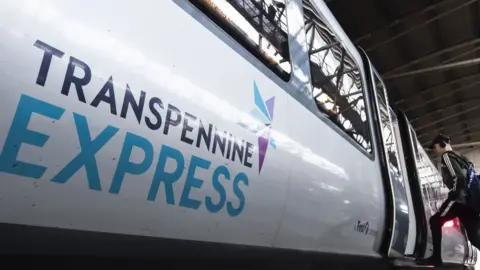 Danny Lawson/PA Wire
Danny Lawson/PA WireFollowing months of complaints from passengers in the north of England, the government has confirmed that troubled train operator TransPennine Express is to be nationalised.
With the announcement that the government is to take over running the service which covers the north of England, BBC News has sought reaction from those at the sharp end.
It certainly seems that one thing the politicians and rail passengers can agree on is that drastic action was needed to improve rail services in the North.
After all, in January and February about a quarter of TransPennine Express services were cancelled.
While that did improve to around one in six in March - although that was still the highest rate in the UK - it was nowhere near good enough to satisfy passengers such as John Wilkinson, 73, from Cumbria.
Waiting on the concourse at Hull's Paragon Station following the government's announcement, he said simply: "Something had to be done."
He added: "One in six trains cancelled is not good enough.
"I'm all for nationalising TransPennine Express - as long as it doesn't cause the same problems it caused previous privatisations."
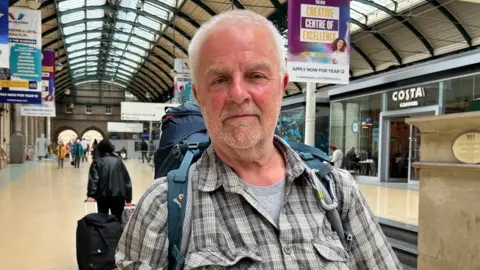
Meanwhile, in Sheffield, John McCreedie, 67, who uses TransPennine Express services to travel to Manchester, said he was "very pleased" by the announcement.
"They ran an atrocious service and what damns them most is the last minute cancellations," he said.
"They don't deserve to continue running such an important service."
Film-maker Gemma Thorpe, 41, who regularly travels from Sheffield to Bolton for work, said: "When the transport is terrible, it contributes to not being able to work as creatively or productively.
"You do feel quite isolated at times."
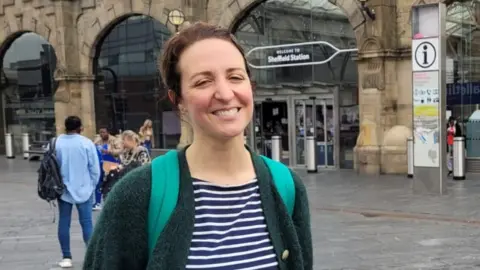
On the other side of the Pennines, in Greater Manchester, Tom Whelan, 59, from Bramhall, said he typically used TransPennine Express services at least twice a month.
He said: "They are really disruptive. Trains are often cancelled. They're packed and there are often not enough carriages."
Mr Whelan said he very much supported the nationalisation of the rail industry.
"Take it back into public ownership and invest more in the railways," he added.
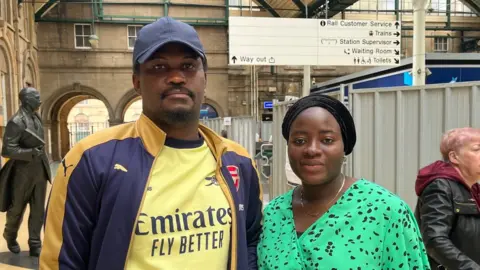
Back in Hull, Azeri Oladeju, 35, and wife Adebusayo, 33, were about to travel to Sheffield.
Mr Oladeju said: "Efficiency and reliability - that's what people want. If that's there, people will use the trains more."
Such was the unreliability of train services that Mr Oladeju said he was considering taking a bus to London, where he had an appointment later this month.
Mrs Oladeju added: "We just can't rely on trains."
'People have lost confidence'
It is not just passengers who have felt the impact of poor train reliability in the north of England.
Marc, who did not wish to give his surname, has run a café at Grimsby station since September 2015.
However, he said he was going to have to close the business due to a falling customer numbers.
He said: "They are not fit to run anything. Footfall has gone down a quarter.
"At 8 o'clock in the morning, there would be 150 people in the train station. This morning there were 27.
"People have lost confidence in the trains."
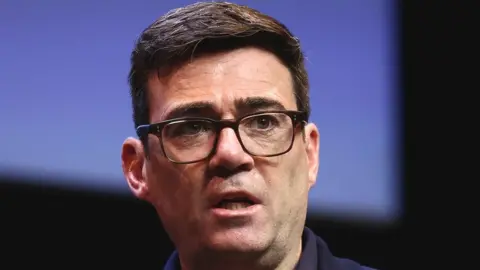 Reuters
ReutersPoliticians have also put the boot in to TransPennine Express following the news it is to be nationalised.
Andy Burnham, mayor of Greater Manchester, told BBC Radio Manchester he was relieved at the announcement because "a fresh start was needed on TransPennine Express".
He said: "Well, now we've got that fresh start, so I'm grateful to the government for listening to us - myself and the other mayors across the North.
"They now have spoken about working with us to reshape the railways of Greater Manchester and the north of England and that's a great opportunity.
"To use a railway analogy, light at the end of the tunnel. It's been a long tunnel, but I'm feeling upbeat about things today."
Mr Burnham said passengers and TransPennine staff "haven't half suffered", adding they have had to "take the flak for months, if not years, for the failures of their bosses".
He said now was the time "to have more public control over rail and buses services" and added he was ready to work with the government "to find a way forward".
However, Mr Burnham advised the government not to "leap back to the privatised system".
"It hasn't worked for passengers," he said.
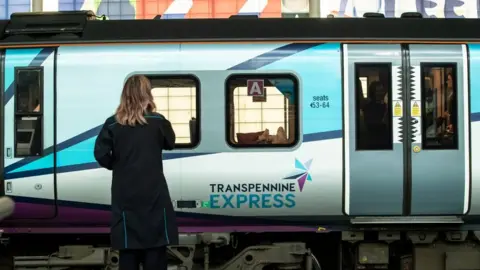 Danny Lawson/PA Wire
Danny Lawson/PA WireMartin Vickers, Conservative MP for Cleethorpes, said had the government renewed the contract for TransPennine Express, it would have been "rewarding failure".
"For the past 18 months, the service on the Cleethorpes-Manchester route has ranged from unreliable to appalling," he said.
"I recognise the dispute with the unions has been a factor, but the many assurances I have received from the company that things would improve have proved equally unreliable."
North of Tyne mayor Jamie Driscoll had previously lobbied for TransPennine Express's owner First Group to be stripped of its contract.
He said: "People across the North have been suffering appalling services from TransPennine Express for years.
"I've heard of people having to get taxis from Manchester airport to Newcastle because trains were cancelled at short notice.
"I've been lobbying TransPennine to improve, and lobbying the Secretary of State not to renew their franchise, along with my fellow Labour mayors Andy Burnham, Steve Rotheram, Tracy Brabin and Oliver Coppard.
"We use the trains, we talk to our people - we knew what needed to happen."

Analysis by Spencer Stokes, BBC Look North Transport Correspondent

TransPennine Express has the worst train performance rate in the country.
On some days during the winter, it was cancelling nearly half its services, leaving passengers stranded at stations for hours.
There have been persistent calls from elected mayors, MPs and passengers for the company, which is owned by First Group, to lose its contract.
That has now happened, meaning the government's so called Operator of Last Resort takes over - effective nationalisation of the contract.
TransPennine Express joins Northern and LNER, which have already been brought under government control.
It means the bulk of the north of England's rail network is now in public hands.
But don't expect services to improve immediately.
Many of the issues around cancelled trains stem from an industrial dispute with drivers. Until that is solved, passengers may still have to endure many more months of cancelled services.
There had been speculation that TransPennine Express would get a short contract extension - as happened with Avanti on the West Coast line earlier this year.
But this time the government has unexpectedly chosen the full public ownership model.

Follow BBC Yorkshire on Facebook, Twitter and Instagram. Send your story ideas to [email protected].
